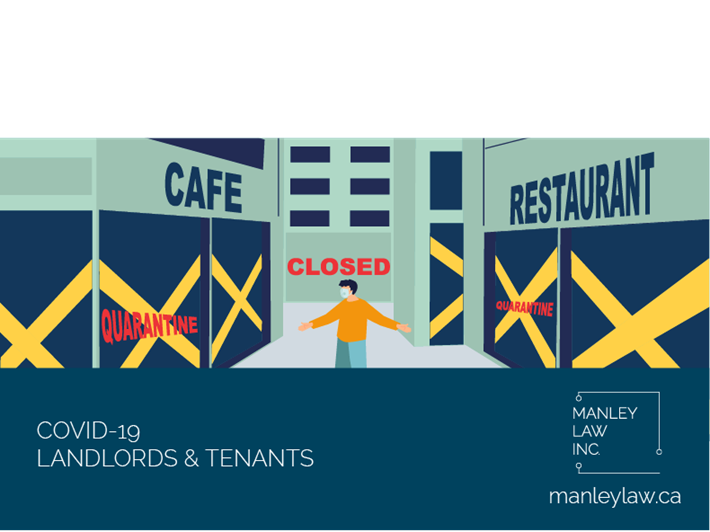On March 27th, the Federal Government announced additional measures to help citizens and businesses cope with the economic impact of COVID-19; these measures included a 75% wage subsidy and loans for small/medium enterprises. On that same day, the Nova Scotia government also announced additional measures put in place under the Emergency Management Act. Among these additional measures was an order prohibiting landlords of retail or commercial spaces from evicting tenants or seizing and selling tenant belongings to cover unpaid rent.
Here's the order:
Effective as of 6:00 am on March 31, 2020, all retail and other commercial landlord are prohibited from exercising the remedies of notice to quit or distress available under a commercial lease, commercial agreement, the Tenancy and Distress for Rent Act, or otherwise for rent due on or after March 22, 2020 from a retail or commercial tenant who has been required to close their business or their business has between substantially and directly restricted under the requirements of a Medical Officer's order issued under the Health Protection Act.
Punishment for failure to comply with this order could result in fines between $500 and $10,000 for individuals and up to $100,000 for companies.
What does this mean?
Commercial leases have two main remedies when rent is unpaid:
- Notice to Quit - where the landlord evicts the tenant for unpaid rent.
- Distress for Rent - where the tenant has not paid rent for a certain period of time and the landlord can enter the space and sell their inventory, equipment, and other items to cover the unpaid rent. There is, of course, a property procedure for using this remedy.
The Nova Scotia government has used the extraordinary powers in the Emergency Management Act to prevent landlords from using their leases (contracts that the landlord and tenants have signed) to collect their rent. This means tenants who can't pay - don't have to during this period of time, and landlords can't do anything about it during this period of time.
Who does this impact?
This order does not apply to all tenants. If a tenant is an office space, for example, a landlord can still take advantage of the Notice to Quit and Distress for Rent remedies. The order only prevents these remedies from being used against tenants who are engaged in the following businesses:
- Gyms and fitness establishment,
- hair salon
- barber shop,
- spa,
- nail salon,
- body art establishment,
- restaurants offering in-person dining service,
- drinking establishment,
- registered day care,
- craft brewery or distillery with tasting room,
- personal service business serving only individuals,
- dentist,
- massage therapists,
- naturopathic doctor,
- Chinese medicine practitioner,
- Acupuncturist,
- Live, performing arts for audiences
These are the types of businesses the province ordered to close on March 22nd. The order does not apply to residential tenants or businesses who are not on the list of businesses ordered to close on March 22nd.
Rent Deferral Support Program
The Nova Scotia government has also put in place a Rent Deferral Support Program aimed at helping landlords recoup some of their losses associated with the order. Support is available for up to $15,000 per tenant - up to a maximum of $50,000. The important thing to understand is that this is an indemnity, meaning you're not entitled to the $15,000 if you defer rent collection. You can only apply for the government to repay you for actual losses in the amount of $50,000 (maximum).
For example, if you sign an rent deferral agreement with a tenant and they fail to repay the rent as required under that rent deferral agreement, you can apply to this program to recoup the rent lost from that tenant for the period of time between April 1st and July 1st.
The criteria for qualifying includes having entered into a rent deferral agreement before April 1, 2020. This rent deferral agreement must cover the period of time between April 1, 2020 and July 1, 2020. The Rent Deferral Agreements do not need to forgive the rent payable between April and July - the payments are deferred. The agreement must include provisions for repayment.
As an interesting side-note, the total amount for the program is capped at $5,000,000. Meaning, it's possible if the total claims by landlords across the province exceeds that amount, some landlords won't be getting paid or all landlords will be getting paid a little less. Time will tell how effective the program is, but for the time being, it provides a bit of certainty for landlords and tenants alike in these incredibly uncertain times.
| This post was written by Anna Manley. If you'd like to contact Anna you can send her an email: [email protected] |








0
This post does not allow comments.- 1
arrow-eseek-eNo items to display